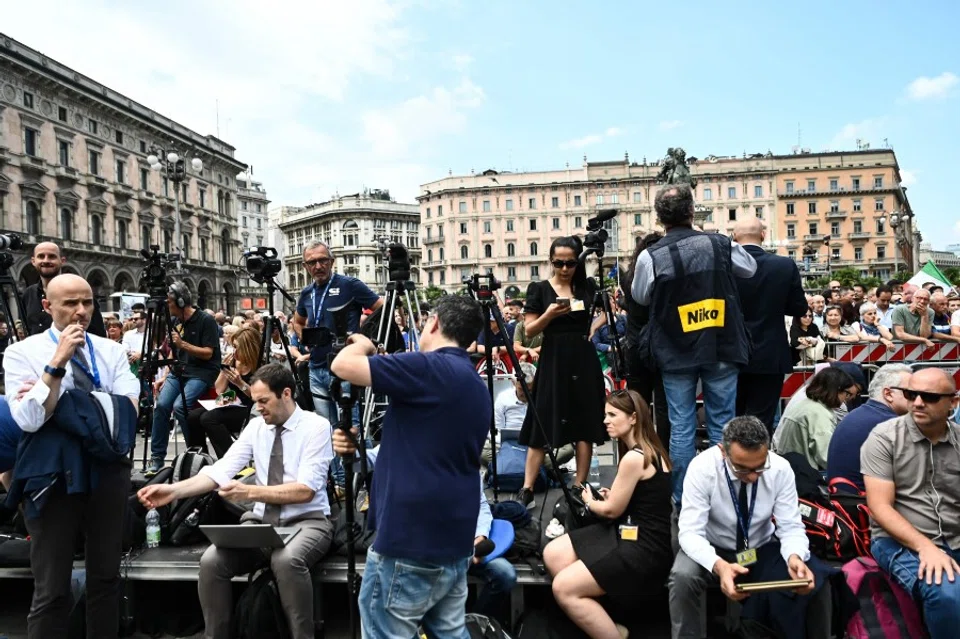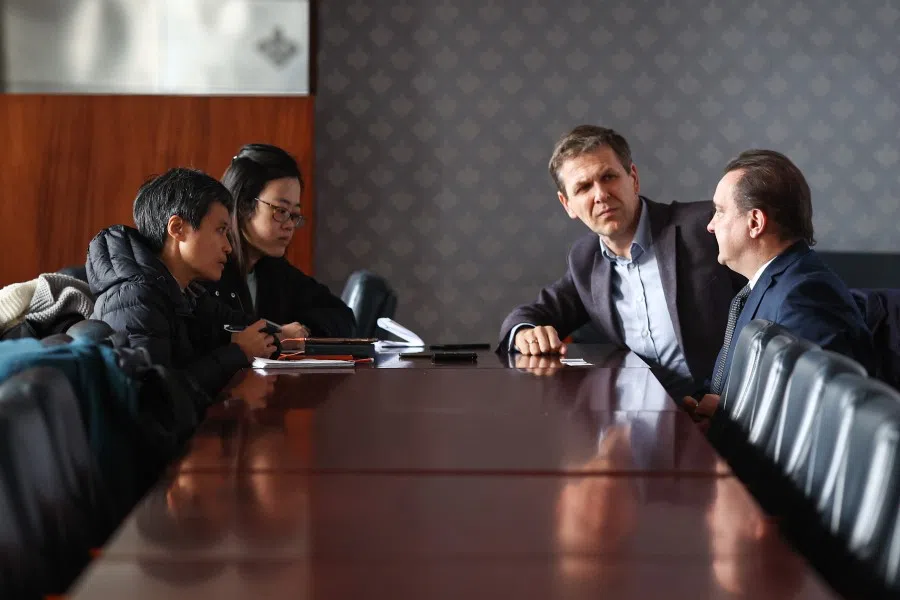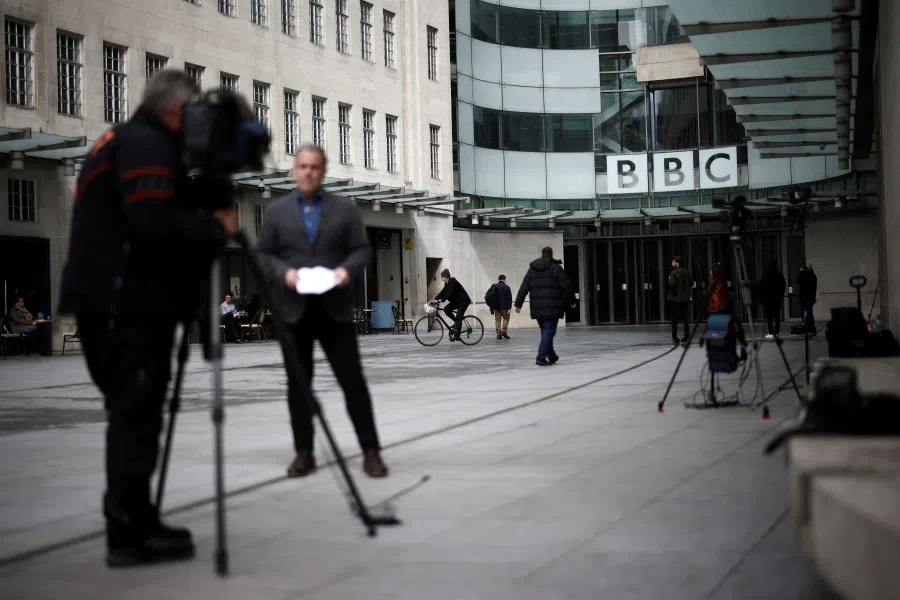Can we still trust the media amid falling media credibility?
Do people still read, watch and listen to the news today? Second, is the media, especially the traditional media, still credible? Answering these questions will lead us to the answer as to whether it matters if journalists will be replaced with the dawn of generative AI.

Learning much after reading the excellent article "Generative AI: a Crisis or an Opportunity for the Mainstream Media?" (《生成式人工智能:主流媒体的危机还是契机?》) by my former boss Lim Jim Koon in this column last week, I intended to follow that with an article discussing the issue of AI versus the journalist.
However, as I made a mental outline and thought more about it, I realised that the more pressing question should be: is it meaningful for this profession to be replaced?
There are at least two more fundamental questions involved here. First, do people still read, watch and listen to the news today? Second, is the media, especially the traditional media, still credible? If there is no credibility, does it matter if it is replaced?
In fact, Jim Koon also touched upon the latter. He urged the media to safeguard the bottom line, expressing the view that "in this turbulent world in which rumours abound, the people have a greater need for credible and reliable media to unravel the truth and offer guidance".
In short, the end of the mainstream media is nigh should the conclusion to any of these two questions be negative. Who cares if there is competition from AI if the colloquial "rice bowl" is already broken?
Perhaps I merely read news like a serial novel, no different from reading the serialised Jin Yong wuxia novels in the newspapers.
When news matters to a child
On the first question, let me share how I first came into contact with the news.
I recognised very few Chinese characters when I was in lower primary school. However, I fervently read Shin Min Daily News at home in 1974 and 1975 because it reported on the Vietnam War almost daily.
As the Viet Cong headed south by the day, the long and thin shape of Vietnam gradually became vivid to me. I knew when the war had reached Hue, and in no time the names Da Nang, Nha Trang and finally Saigon (today's Ho Chi Minh City) hit the headlines. I had already known these places in Vietnam, including Hanoi and Haiphong in the north, before I heard of tourist attractions like Phuket, Pattaya and Bali.
There was neither the internet nor history classes, and I did not understand what communism, the Cold War and the domino theory are. Perhaps I merely read news like a serial novel, no different from reading the serialised Jin Yong wuxia novels in the newspapers.

I mention this childhood memory as a contrast to today's children. Have they started to learn about the places in Ukraine, like Kiev, the Crimean peninsula and the ravaged Bakhmut? Do they know about the Black Sea and the Sea of Azov within? Or rather, they have neither the interest nor concept, and are busy swiping on TikTok, playing computer games all day, or are either at tuition classes or on the way to one on weekends?
The news we want
Many adults still read the news but are not necessarily concerned about war or the making of an ideal world.
Due to the nature of my work, I often pay attention to reports on news circulation and popularity of comments to news. News that is more popular and widely commented upon is invariably on celebrities' confessions of love or divorces. Social news is also particularly popular. The news of two men scuffling in a shopping mall will easily rank among the top ten, and the same news involving two women will be even more eye-catching.
I am quite resigned to this but I let it go after thinking about it. Although this type of news is very mundane, it satisfies the people's voyeurism and adds spice to a boring life, providing fodder for conversations as it occurs in the neighbourhood.
In many countries, some local newspapers and websites still exist because they focus on local content.
Another example is the long queues at the top TOTO-winning outlets and the prize money shared by the number of people the following day. I may find this pointless, but many personally identify with it or at least consider it a conversation topic.
Understandably, there is a lack of interest in the so-called hard news, which is mostly boring, solemn and always recurring, with politicians repeating the same old stories ad nauseum. Unless it is really personally identifiable, scanning the news headlines will suffice.
Note that I have repeatedly emphasised "personally identifiable" as the important element of news. In recent years, we have paid attention to news on Covid-19 because we want to know how to protect ourselves and our families. In many countries, some local newspapers and websites still exist because they focus on local content. They inform readers about who has passed away in the town, when the snowstorm will hit and what has been discussed at the town hall meeting. As a public good, they are a necessity.

Singapore is smaller than any county or district in other countries, so our national newspaper is also a local newspaper in a sense. If we do not report everything on our little island, do we expect the international media to do it for us or rely on citizen journalists to randomly post their encounters?
...an article with the human touch will be readable and particularly resonate with readers.
Citizen journalists can provide videos of two men or two women publicly scuffling but there are many far more impactful events in the world every day that need journalists to verify and report on. There are also many issues in life that must be considered, dealt with, or at least understood. Without the mainstream media, the dissemination of information and the sharing and exchange of views will only be fragmented and disorderly and simply become discordant echoes in rooms.
Last month, a forum letter to Lianhe Zaobao that complimented the kind act of a young person reached more than 425,000 people on the newspaper's ZaobaoKopitiam Facebook page alone! Yes, the number is correct and not my typographical error. This amazing number can only be explained by what has often been articulated in journalism textbooks, that an article with the human touch will be readable and particularly resonate with readers.
We still have a need for news but different news, like different foods, appeal to different people. Some prefer news as tidbits or appetisers, while others must consume a full-course meal to gain sufficient strength to work. There are also the "nutritionists" who deliberately choose in-depth topics and incisive commentaries. No matter, for as long as there are customers, the restaurant business will continue and journalists will gladly be the "chefs".
However, if hygiene is neglected and the food always causes stomach upset, the customers will not return. This brings us to the second question of media credibility.
Media credibility falling globally
Edelman, a multinational public relations company, conducts a large-scale annual trust and credibility survey in many countries. This year, 59% of respondents in Singapore trust the media, unchanged from last year. However, upon checking the 2019 report, it was 71%, the highest since 2013. Fortunately, in 2023, 64% of Singaporeans still trust "traditional media", higher than that for "search engines" (60%), "owned media" (45%) and "social media" (41%).
... trust in the media has declined in 16 and gained only in six countries, with five remaining unchanged, including Singapore.
Evidently, media professionals like us in traditional media have been implicated. Although my colleagues and I have indeed been guilty of less-than-watertight gatekeeping, errors in language and reporting, and even propagating certain positions on some issues, the traditional media has definitely outperformed the owned media and social media. I often receive mobile messages containing so-called "news" from friends, asking "Is this true, Peter?" I am made to feel like a human lie detector.
Taking the long view, though, the people's overall trust in the media has indeed declined. Edelman has found that among the 27 countries over the past year, trust in the media has declined in 16 and gained only in six countries, with five remaining unchanged, including Singapore.

The Reuters Institute for the Study of Journalism also conducts annual surveys. This year's report has just been published. Findings show that "video-based content, distributed via networks such as TikTok, Instagram and YouTube are becoming more important for news, especially in parts of the Global South" and "trust in the news has fallen, across markets, by a further 2 percentage points in the last year".
Already in 2022, 15% of Americans said that they accessed "none of the listed options" (of news sources) in the past week, a surge from 3% ten years ago. Japan, the UK and France have a high proportion of such "disconnected news users". In almost all the major Western countries, the proportion of people who 'sometimes or often actively avoid the news' has increased over the past five years, with nearly 30% giving the reason that 'the news is untrustworthy or biased'. Like the Edelman survey, more countries in the 46 countries surveyed by the Reuters Institute show a decline in trust of the media.
Due to geopolitical friction and intensified ideological struggles in recent years, however, they have revealed their true colours. Their decline is rather obvious.
This is definitely a wake-up call, especially for the mainstream media in the West, which have always stood for objectivity, fairness, independence and authenticity. Due to geopolitical friction and intensified ideological struggles in recent years, however, they have revealed their true colours. Their decline is rather obvious.
In the past, the Western media made use of deft rhetoric skills, ingenious self-justification as well as deliberate and veiled ambiguity. They may be based on genuine content, but presenting half-truths is just as misleading. They also resort to frequent repetitions (prejudices repeated 100 times can also become truths) to gain the moral high ground and enhance Western perspectives, interests and values.
Now that the battle lines are drawn and the first salvo fired, there is no further need for pretence. The parties have mobilised and are in battle mode.
Western biases
This kind of cognitive warfare is incessant on your mobile phone and computer screen, and is a well-intentioned reminder that the media, including the newspaper you are currently reading, uses foreign content that may convey biases. The majority of the readers are unsuspecting or indifferent because the foreign content does not come with billows of gunsmoke or rivers of blood.
One can write a book about the prejudices, double standards and hypocrisy of Western journalists and their bosses. For example, Russia is the villainous aggressor while Ukraine represents justice and deserves our help as it is unfortunate to have its territories occupied and civilians killed. However, this standard is inconsistently applied when it comes to the Israeli-Palestinian conflict in a reversal of positions.
Despite being the occupier and killing the innocent, Israel is described not as the villain but merely seeking retribution. On the contrary, the party that lost its land and had more of its people killed is named as terrorists. Whenever a child in Gaza is killed in a missile attack, the news will explain that "someone had concealed weapons in the building". The subtext is that the fault lies not with the person who fired the missile. Sometimes, I wonder if the same journalist who reports on the two conflicts would be rendered schizophrenic.

The recent peace deal between Saudi Arabia and Iran is a watershed in the Middle East. However, the news was presented at the bottom of the BBC website which invited criticism of the news outlet downplaying its importance on purpose. Such incidents continue to eat away at the reputation and trust of the media. China the mediator in the peace deal, is popularly seen and portrayed as the villain in the West. It is no wonder that some irate readers have replaced the first B (for British) in BBC with B for Biased.
... the media in China still relies on its army of netizens, which often merely duplicates domestic propaganda for direct use in external communication. This is unsophisticated and lacks finesse.
China's inherent deficiency in credibility
Let us examine China, the number one rival of the Western world, in this new Cold War. Clearly, China understands the importance of psychological warfare. After all, the "courage to carry on the fight" is ingrained in the DNA, and China has never shied away from confrontation, as remarked by its foreign ministry spokesperson: "For our friends, we have fine wine. For jackals or wolves, we welcome them with shotguns."
However, China's shortcoming lies in having only official media and party media but not liberal private media, and therefore it suffers from an inherent deficiency in credibility. Furthermore, the West are masters of the game of media manipulation, having dominated for centuries. In contrast, the media in China still relies on its army of netizens, which often merely duplicates domestic propaganda for direct use in external communication. This is unsophisticated and lacks finesse.
Censorship is China's biggest flaw. Online streamers have probably experienced receiving instructions from platform administrators around Children's Day on 1 June to take a break from live streaming in the subsequent few days, for "special reasons" that need no further explanation. (NB: The Tiananmen Square incident occurred on 4 June 1989.)
They are also prevented from saying many things and must, if need be, use phrases such as "three years of natural disasters" (referring to the Great Chinese Famine) and "political turmoil in 1989" (referring to the Tiananmen Square incident) instead, which is no different from calling a stag a horse in deliberate misrepresentation.
To do a better job of "telling China's stories", it is crucial that the stories are unfabricated and that both the good and bad news must be reported. Otherwise, one deceives only oneself but not the entire world!
The day the newsroom loses its credibility will also be the day it closes for good and journalists lose their jobs.
The Chinese saying "Without the people's trust, the state will not survive" (民无信不立) also applies to the media in both the East and the West, especially in this era of information explosion that is also raucously anti-intellectual. Credibility, therefore, becomes fundamental in the lifelong career of media professionals. At the launch of his new book recently, Jim Koon hit the nail on the head when he described credibility as "the last lifesaver".
The day the newsroom loses its credibility will also be the day it closes for good and journalists lose their jobs. It will be immaterial whether ChatGPT exists or how powerful it ultimately evolves to become.
This article was first published in Lianhe Zaobao as "认知作战与媒体公信力的沉沦".
Related: Chinese butting heads with Western media: Irrational nationalism or deeds of justice? | Interference in China's media industry: Even Global Times editor Hu Xijin 'cannot stand it' | Zhengzhou floods: Netizens berate local government and media for inadequate response | Media coverage of Beijing Winter Olympics shows parallel worlds | When a news media company becomes radically politicised: Jimmy Lai and the Apple Daily saga | Beijing hospital fire: Social media silence shows tightening public opinion space in China





